The Incredible Story of How One Luxury Resort Survived the Pandemic
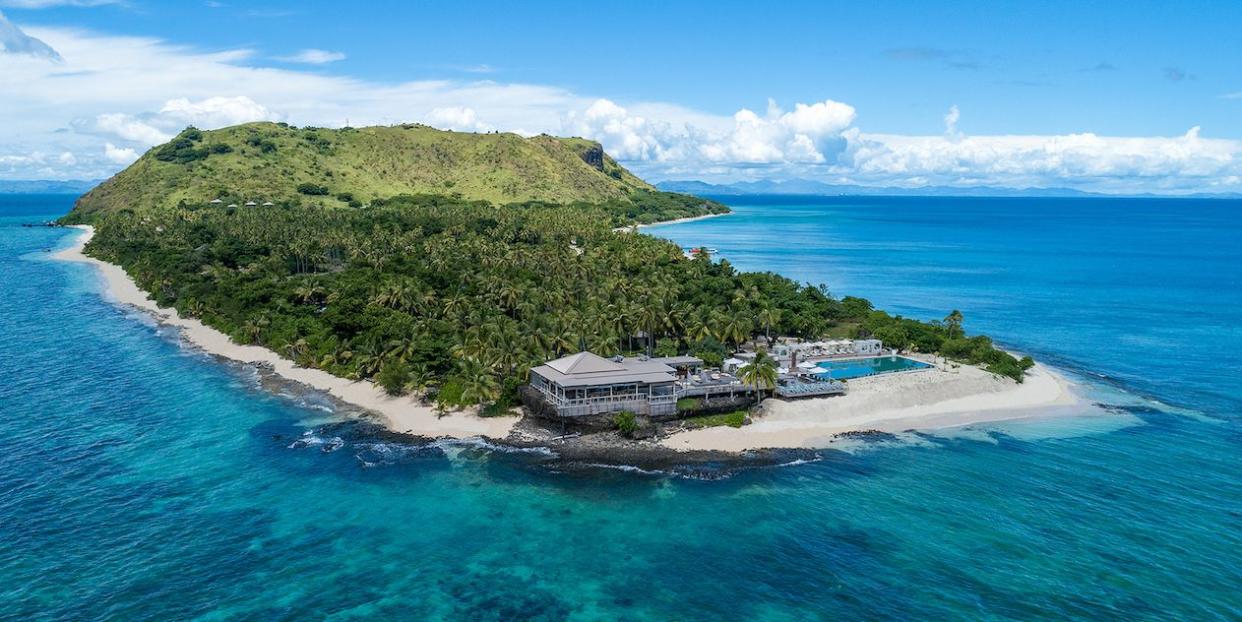
There was more than $1,750 dollars’ worth of cheese in the walk-in refrigerator in March of 2020 when word came down: VOMO Island Fiji, a tony resort on a 225-acre private island in the South Pacific, would have to close. No one could say for how long. But a then-unknown virus called COVID-19 was spreading rapidly across Asia and while there had been few reported cases in Fiji, the government was shutting its borders to international travelers.
The effect on the economy was immediate and troubling. Tourism accounts for about 40% of the country’s GDP and 120,000 people would lose their jobs overnight, according to Tourism Fiji. The situation became so dire that the country’s prime minister publicly offered to open the border—but only to high-net worth individuals willing to visit for three months and presumably spend generously. The government also launched the “Blue Lanes” initiative to welcome tourists by yacht.
Google co-founder Larry Page is said to have ridden out the pandemic on his own Fijian island. But everyone else was stuck. Like, seriously stuck. The resort at VOMO is just a 40-minute boat ride from the mainland—less by helicopter, which is how many of the hotel’s well-heeled guests typically arrive. And most of the staff had already been sent home to their families. But a skeleton crew of around 40 people remained on the island, known for its white sand beaches and aquamarine water.
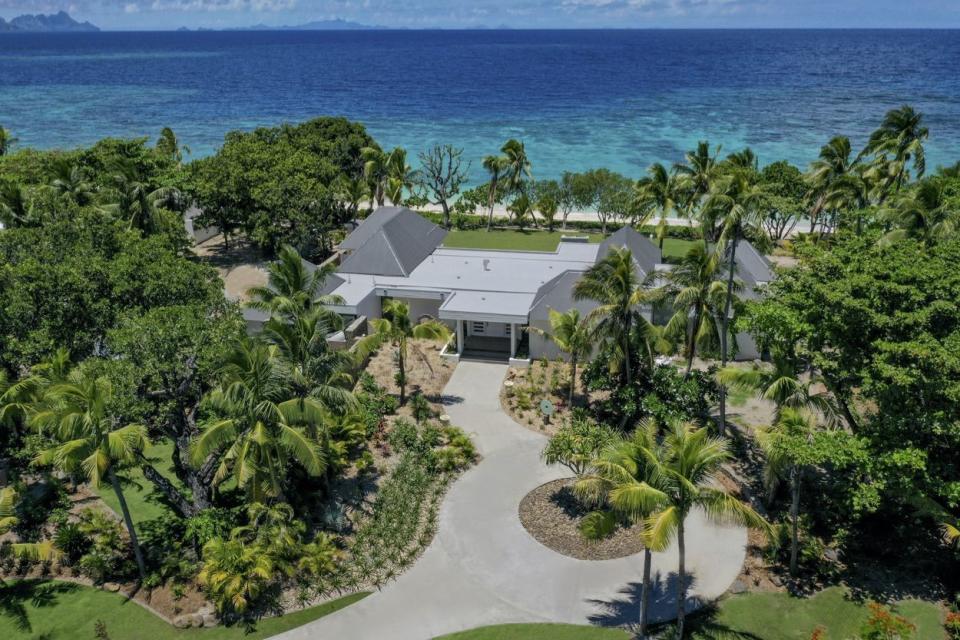
VOMO's general manager, Justin King, who lives on-site with his wife and two young children, remained optimistic. How long could this shutdown last? The Chinese New Year—always a moneymaker for the hotel—had been a bust. But surely they’d be open for Easter, right?
Then Easter came and went. And the reality started to settle in. The Fijian staff—a proud, dedicated lot who exemplify the country’s famous generosity of spirit—were hopelessly separated from friends and family with no idea if or when they’d be reunited. And it was unsettling to say the least. All anyone really knew was that $1,750 dollars in French brie and marbled blue cheese was sitting in the kitchen ready to spoil if the island lost power. So, they did what anyone would do in that situation: They started eating. “And for seven months,” King says, “no one came on or off the island.”
Thus begins the untold story of life on VOMO Island during the pandemic, a tale that plays out like The White Lotus meets Castaway (which incidentally was shot in Fiji). King, a 40-year-old Aussie known for his boyish enthusiasm, quickly realized a proper schedule would be crucial to keeping everyone (including himself) sane. And so, the staff would meet every morning on the tennis court to sort out that day’s chores. “We’d talk about what we wanted to do,” King says. “Then we’d putter around and clean.”
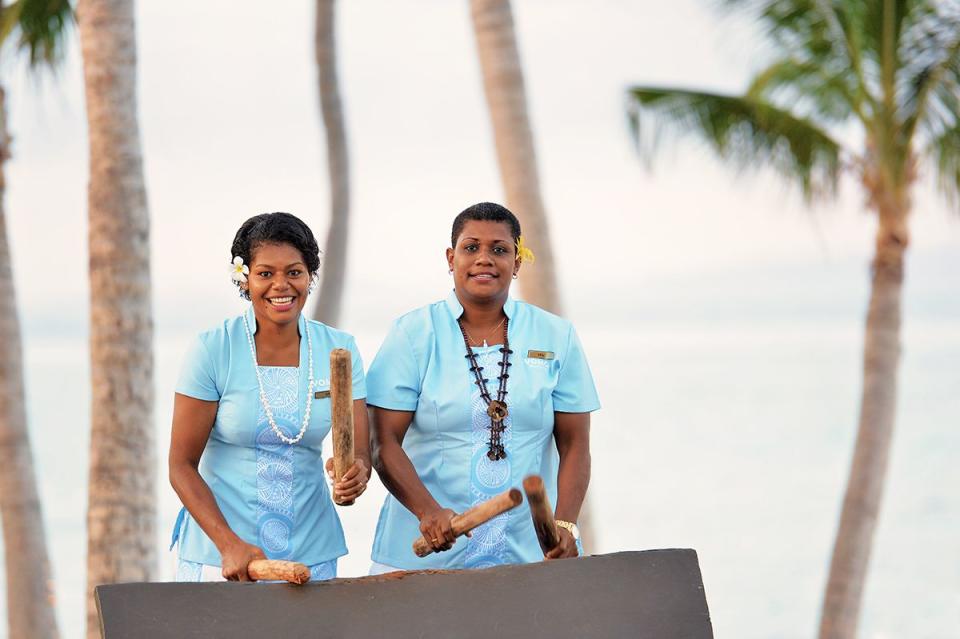
After dispensing of the cheese, the staff subsisted on $30,000 in frozen meat. Thankfully, supplies started to arrive weekly by barge. Rapid tests for COVID-19 didn’t exist yet. And the staff was forced to greet the rations in full PPE, spraying down everything with disinfectant remotely.
There are worse places to be marooned. VOMO is a lush, verdant island, made up of 28, mostly-oceanfront villas plus five residences—three-, four-, and five-bedroom homes that typically rent for around $6,000 a night, including butler service and meals. The ocean is bathtub-warm, the coconuts plentiful. And the staff tried to keep things light. At the end of April, they organized a massive island-wide Easter egg hunt for the few children who remained.
King’s plan was to be ready to re-open at a moment’s notice. That’s the pitch he made to VOMO’s shareholders (who agreed to keep every staff member—marooned or otherwise—on at least partial salary through the pandemic). “July is our biggest month,” he says. “We thought, We’ll definitely be open by July.”
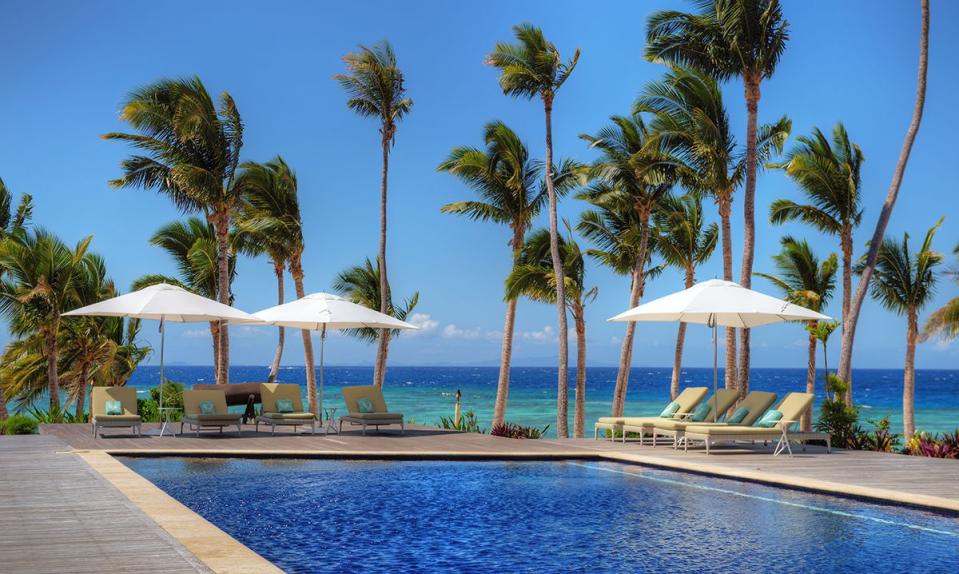
Then July passed. And, well, that’s when things got weird. The hotel’s boutique—stocked with playing cards, sunscreen, and sundries—had sat undisturbed. But when the staff noticed the fabrics on the dresses and sarongs starting to weather, King told them to take whatever they wanted. More than once they put on a fashion show to entertain each other.
Workers would catch and filet Spanish mackerel, trevally, and snapper to spice up the menu. Meanwhile, Ifereimi Naruma, the hotel’s personal trainer, planted a massive garden—with cassava root, pineapple trees and banana trees, sometimes playing Shania Twain songs from a portable speaker as he and his wife Vani toiled. Tomatoes, beans, herbs, chilis, and Aloe Vera followed, and the crops grew quickly. Though a small army of flightless birds arrived on the barges, threatening the progress.
There was also the matter of the South African family of four who were stuck at VOMO; they’d been migrating to New Zealand but weren’t yet legal residents and thus wouldn’t get through customs even if there had been flights available. They were citizens of nowhere like yet another Tom Hanks hero, this one from the movie Terminal.
But there was only so much work one could reasonably do especially with no opening date in site. And so, Fridays were declared “Sports Day”—a time for exercise and recreation, including cricket, rugby, and golf. One afternoon, some staff members threw a party in the adult’s only infinity pool, called The Rocks, dipping into the wine cellar for the “good champagne,” one employee tells me.
On particularly hot days, another said he’d retreat to one of the air-conditioned residences to binge episodes of The Crown. For special occasions—like someone’s birthday—the inhabitants might take a speedboat across to the deserted Little VOMO Island where (in the Before Times) guests paid a premium to enjoy a private picnic. King says of that period: “My kids woke up thinking, Which of the eight pools am I going to swim in today?”
At least he had his immediate family with him, he acknowledges. The staff had to make-do with Wi-Fi and WhatsApp. While the official Covid numbers in Fiji were low, the threat was real and present. There is a celebrated Fijian custom where people gather around a wooden bowl called a Tanoa to drink kava, a mild sedative made from the root of a pepper plant, sharing stories through song. “Friends, acquaintances, rivals and even enemies will drink from the same Tanoa seeking forgiveness and making amends, which is such an integral part of our culture,” explains Tim Tuiqali, VOMO’s guest experience manager. So it was particularly upsetting when they heard about a nearby island where a man had broken quarantine, sat around a kava bowl, and promptly infected 48 people.
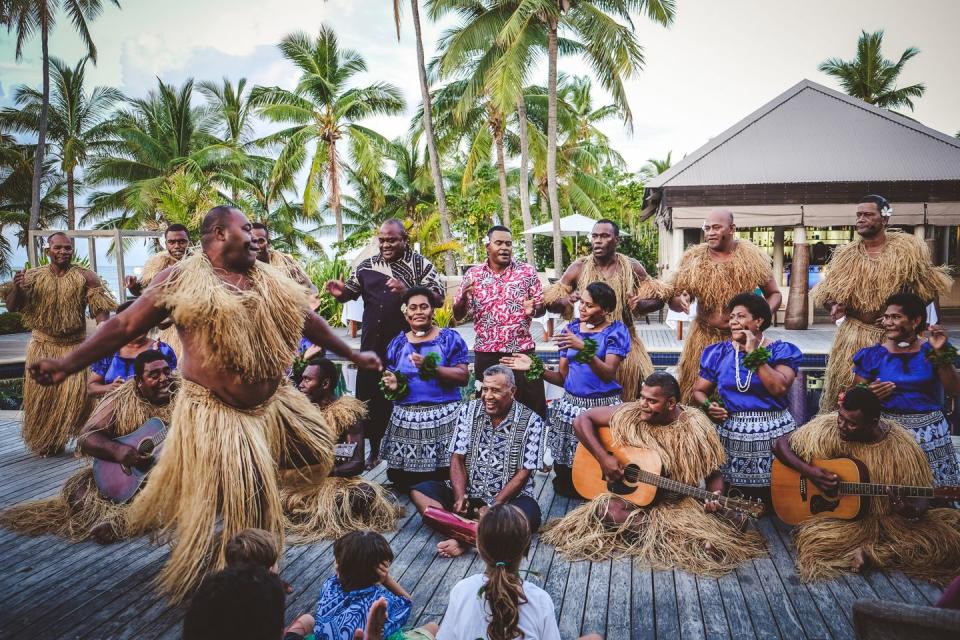
July bled into August and then September. Finally, in late October of 2020, relief came: the Fijian government, home to 333 private islands, was lifting restrictions on domestic travel and the inhabitants of VOMO could finally return home. The emotional release was immediate. “The fact that we came through it,” King says proudly of the lockdown and his staff, “was probably the highlight of my career.”
But the country’s economic challenges remained, especially as the Delta variant scuttled Fiji’s grand reopening plans. In total, the island nation would be closed to international travelers for a full 20 months. While an opening date was set for December 1, 2021, the government wasn’t taking any chances. Vaccinations would be mandatory for locals, they announced, with a straight-up gangster slogan: “No jab, no job.” (Nearly 98 percent of adults have since had the first dose; hotels like VOMO are part of the Care Fiji Commitment, which certifies that every staff member one encounters is fully vaccinated.) The government also brought in a new CEO to lead Tourism Fiji, Brent Hill, the man credited with reviving tourism to South Australia in the wake of devastating bushfires.
There were no guarantees guests would return. VOMO had been shuttered for something like 87 weeks. Omicron caused some cancellations, but King is proud to report bookings are up 26% over the resort’s previous best year—with a marked increase of visitors from the west coast of the United States. The pitch is compelling: With Fiji Airways making direct flights from L.A. and San Francisco, you can pop a Xanax and wake up in paradise.
The very first guest back to VOMO was, believe it or not, the actress Rebel Wilson. She was recently named Fiji’s brand ambassador, and, in late November, she arrived with a production team of around 100 people to film the campaign. On the surface, VOMO’s staff hadn’t missed a beat. The garden now supplies 50 percent of the produce to the two on-site restaurants. Construction on a four-bedroom oceanfront residence (with its own pool) was also finished weeks ago.
But emotions ran deep. The staff typically greets guests with a traditional Fijian song, “Bula Maleya.” Tim Tuiqali, the guest experience manager (a sly, big-hearted environmentalist who grew up nearby in the Ysawa islands), explains the lyrics. Fiji had been a British Colony during the two World Wars, he says, and “Fijians were drafted to go fight. We did not know whether people were going to come back alive or dead.” This song was composed “to welcome back the first soldiers. Now it is a welcome song for anyone that comes to Fiji.”
When Rebel and her team landed, Tuiqali says, “We hadn’t sang that song in a while. I kind of held back just to see how it would sound.” When he tried to join in, he was so overwhelmed that his voice momentarily failed him. “It was as if we had never stopped singing.”
You Might Also Like

